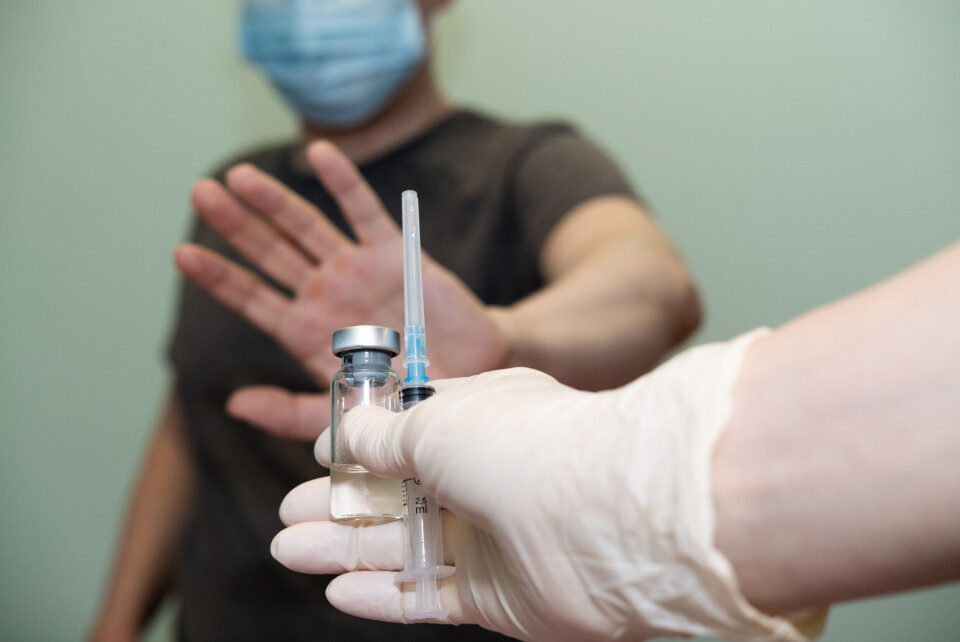-
Funeral held in Normandy for last Native American soldier involved in D-Day
Charles Norman Shay was among first to land on Omaha beach and a recipient of Silver Star and Legion of Honour medals
-
Visual: how healthy do French people think they are?
Progress in smoking rates but more than one in five people polled say they feel they drink excessively
-
Lost cat reunited with French family after 11 years thanks to identification tattoo
Shelter discovered injured elderly cat had identification tattoo which helped to track down previous owners
Who are France’s five million unvaccinated - and what are the reasons?
Access issues, fear, reluctance, ‘anti-vaxxers’? New studies show not all of the non-vaccinated in France are simply ‘anti-vax’

The five million people in France who have still not received a Covid vaccination are not all simply ‘anti-vaxxers,’ new studies show.
It comes days after President Emmanuel Macron vowed to “piss off” non-vaccinated people “to the limit” with restrictions.
He was largely referring to people who are eligible and medically able to have the vaccine but who have chosen not to.
On November 9, 2021, Mr Macron appealed to “the spirit of responsibility to the [then] six million of you who have not yet received any vaccine doses”.
Two months later, his rhetoric has become more forceful.
Read more:Emmanuel Macron admits he wants to 'piss off' the non-vaccinated
And yet, sociologist at health and medical research institute l’Institut national de la santé et de la recherche médicale (Inserm), Dr Jeremy Ward, told Le HuffPost that Mr Macron’s words are unlikely to have a persuasive effect.
He said: “The intervention [Mr Macron’s words] is an example of what you shouldn’t do. All the reports published by the biggest specialists in vaccination reluctance explain that you must highlight the advantages of vaccination [to convince people].
“You won’t convince people by telling them that you’re going to make life difficult for them.”
Yet, since Mr Macron’s appeal in November, one million people have had a vaccine – equivalent to one in six of the previously unvaccinated.
How France’s vaccination rates compare worldwide
France currently has one of the highest rates of Covid vaccination in the world, at 74% fully vaccinated and 79% partly so, putting it in the top 30 worldwide, according to figures from the Our World in Data project at the University of Oxford, and the World Health Organisation (WHO).
This compares to 50% and 59% respectively worldwide, 70% and 76% in the UK, 71% and 74% in Germany, and 62% and 74% in the US. France is even ahead of once-world leader Israel (64% and 71% respectively).
It is, however, behind countries such as Italy, Japan, Canada, Spain, Malta, Singapore, Portugal, and the UAE; as well as Malaysia, China, Iceland, Denmark, Belgium, New Zealand, and even Uruguay and Cuba.
So who are the five million people in France who still remain unvaccinated?
Dr Ward and his colleagues have been researching their “typical” profile.
They found:
-
10.5% of the population, based on a poll of a representative panel of 2,000 adults, said they were not vaccinated and do not intend to be
-
An estimated 2-4% of the French population (between 1 and 2 million people in France) are completely opposed to the principle of vaccination in general
-
Reluctance is high “both because it is a new vaccine” and “a particularly strong context of distrust of the government in place”
-
The reluctant typically include women, young people, people close to right-wing and radical left-wing parties as well as those who do not feel close to any party
-
A third of respondents did not have a firm view or complete opposition to vaccination
Dr Ward said that it was important not to believe that everyone who has not yet been vaccinated is a simple ‘anti-vaxxer’.
He also acknowledged the difficulty of understanding everyone’s motivation, and the limits in his research.
He said: “We know that we are missing a large proportion of the unvaccinated because we have good reason to believe that among the latter, we have marginalised groups, for example, immigrants, single women, very poor people. These types of people are not very present in the survey panels.”
Some have not been vaccinated “not because of an ideological choice, but also because of access issues”, he said.
"Those for whom it is very easy to buy medicines if they need them have had the vaccine. More than 95% of them have been vaccinated or plan to be vaccinated. The proportion is only 82% among those for whom it is very difficult to buy medicine [in general].”
He added that the government was still not investing enough in its “aller vers (go towards)” programme, which is intended to take vaccines to people who would otherwise struggle to access them.
He cited higher rates of vaccination in Nordic countries, “where there is less distance between marginalised citizens and the health system”.
Dr Ward stated that many people in France may have had the vaccine simply because of the introduction of the vaccination pass and the requirement for many professions to be vaccinated to keep working, which put many people under pressure.
He said: “In June, 9% of those vaccinated against Covid conceded that they still had a lot of doubts about getting the vaccine. By August, this had risen to 49%.
“The health pass was certainly useful, but it pushed people to get the vaccine without necessarily convincing them [on the subject].”
Dr Ward added that Mr Macron’s pledge to “piss off” the non-vaccinated could backfire.
He said: “In a context where the presidential campaign is coming up, this intervention will only please the president's existing supporters, and risks further polarising the population.”
Related stories
Emmanuel Macron admits he wants to 'piss off' the non-vaccinated
Coronavirus: Daily updates on the situation in France
Why Emmanuel Macron has often talked about ‘pissing people off’
























